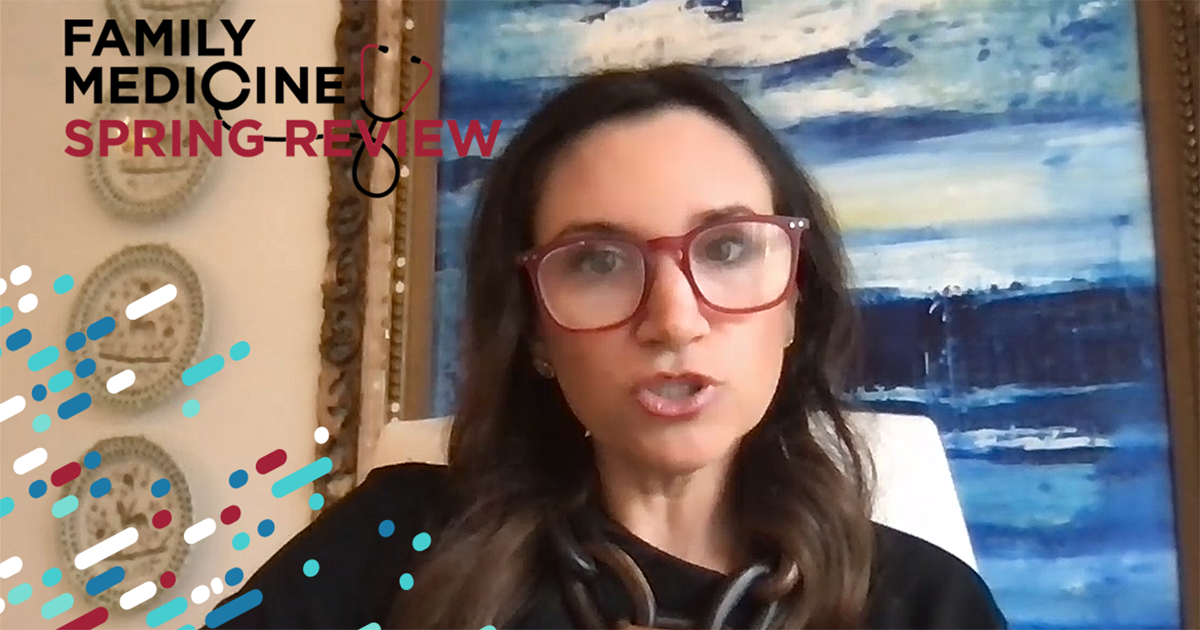Family medicine providers from across the country recently gathered for the virtual University of Arkansas for Medical Sciences’ 2025 Family Medicine Spring Review, where they heard updates on colorectal cancer screening, sleep apnea, obesity and mental health.
The three-day conference was presented by the UAMS Department of Family and Preventive Medicine’s Community Health and Education division, which has provided continuing medical education for 47 years.
“The 2025 Family Medicine Spring Review not only offered continuing medical education credit for health care providers but offered practical insights and opportunities for skill development,” said Alysia Dubriske, M.Ed., the director of UAMS’ Community Health and Education division. “Attendees were able to learn about emerging treatments and gained valuable insight into new technologies and treatment options. By staying informed about the latest developments in healthcare, providers can enhance their knowledge and skills which ultimately leads to better care for patients.”
Colorectal cancer was a major focus on the conference’s first day. Whitney Jones, M.D., a clinical professor of medicine with the University of Louisville, and Francis Colangelo, M.D., a primary care physician with Allegheny Health Care in Pittsburgh, noted that the colorectal cancer death rate in people younger than 55 has been rising by one percent each year since the mid-2000s. However, they said this age group is more open than others to yearly stool-based screening tests such as the fecal immunochemical test (FIT) or Cologuard.
Other speakers addressed a wide range of topics relevant to family medicine. Amanda Deel, D.O., associate dean of the New York Institute of Technology’s College of Osteopathic Medicine, spoke about the role of compassion in healthcare.
“Following a compassion-centered script with patients may feel artificial, but in a study, patients didn’t sense that,” Deel said. “Physicians miss opportunities to practice compassion 70 percent of the time and interrupt patients in the first 11 seconds, on average.”
In a session on sleep apnea, Caris Fitzgerald, M.D., a sleep medicine physician with the Central Arkansas Veterans Healthcare System, offered troubleshooting advice for patients using continuous positive airway pressure (CPAP) machines. CPAP manufacturers estimate that more than 8 million people use CPAP machines each night.
James Tucker, M.D., a bariatric surgeon at Arkansas Heart Hospital, addressed metabolic issues and said that bariatric surgery is not a cure for obesity but a treatment. Sleeve gastrectomy, in which 50 to 70 percent of the stomach is removed, is currently the most common procedure.
On the final day of the conference, Amy Grooms, M.D., of the UAMS Department of Psychiatry, spoke about transcranial magnetic stimulation (TMS) for treatment-resistant depression. Grooms said that 30 percent of patients have a standard response to the treatment, while 18 percent report that the treatment e.
Bill Fantegrossi, Ph.D., of the UAMS Department of Pharmacology and Toxicology, concluded the conference with a presentation on opioids. He said new synthetic opioids bind more tightly to brain receptors than previous drugs, making overdoses harder to reverse with standard treatments like naloxone (Narcan), which may only partially reverse or fail to counteract these newer opioids.
Additional presentations included updates on the HPV vaccine by Portia Knowlton of St. Jude’s HPV prevention program; renal cysts and masses by Marcelo Bigarella, M.D., of UAMS; and long-term effects after curative cancer treatments by Virginia Laliberte, APRN of the Genesis Cancer and Blood Institute.
Angela Driskell, M.D., a wound care specialist with Baptist Health, emphasized the importance of distinguishing between pressure injuries and skin failure. Ashley Acheson, Ph.D. and Jami Jones of the National Center for Opioid Research & Clinical Effectiveness at Arkansas Children’s Hospital shared research on children and adolescents affected by opioid and other drug addictions.

